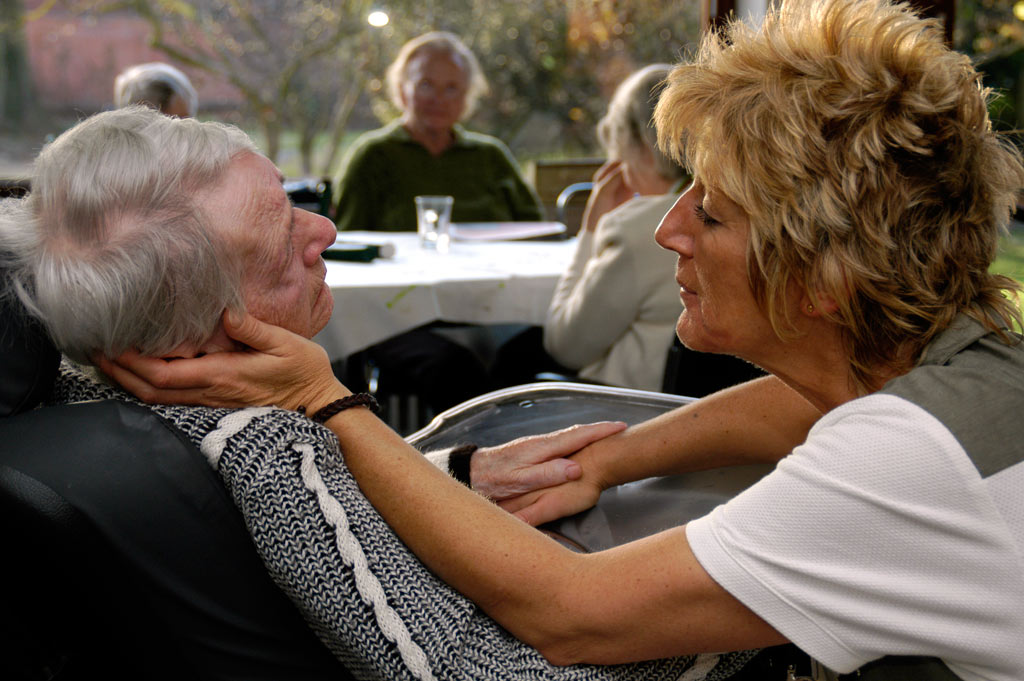Vlaams Ouderenraad Fotobank
PART 2 - The rights of older persons in need of care and support at EU level
The European Union can play a key role in supporting the rights of older persons. Several EU initiatives, policies and directives directly or indirectly target older persons in need of care.
AGE Platform Europe developed a brochure called ‘Active Senior Citizens for Europe, a guide to the EU’ which summarizes the main policies and processes impacting older persons’ rights at EU level. The brochure is summarized in a short guide to the EU, translated into several languages.
2.1 EU policies and legislation

The responsibility for health and social care provision lies with Member States. However, the EU has several tools that it can use to support and promote the rights of older persons in need of care.
A key provision for older persons in need of care is Art. 25 of the European Charter of fundamental rights, which states the following:
“The Union recognises and respects the rights of the elderly to lead a life of dignity and independence and to participate in social and cultural life.”
According to this article, EU institutions should not adopt legislation that goes against the rights of older persons. However, this does not mean that they are free to take any action to promote this right, as they have to respect the competencies of national governments. Moreover, this article is not binding upon national governments, unless they are implementing EU law.
Areas in which the EU has competence to act are:
- gender equality, including through action to better balance care and work responsibilities; violence and abuse;
- non-discrimination on the basis of age and/or disability, including dedicated legislation to tackle discrimination in employment;
- health promotion;
- and the protection of ‘consumers’ and ‘victims’ through the application of common standards
As mentioned above, the EU also ratified the UN Convention on the rights of persons with disabilities.
Finally, the EU supports the exchange of practices and national policy reforms in the field of pensions, health and long-term care.
The main processes that are relevant for older persons in need of care are the following:

-
Non discrimination in the field of disability, applied through the Disability strategy 2010 – 2020 and the implementation of the UN Convention on the rights of persons with disabilities.
The EU has singled out older persons in need of care as one of the key target groups of these two instruments. Nevertheless, it has not given any further guidance on how the principles and guidelines enshrined therein apply to the specific challenges of older persons with functional limitations, nor has it addressed age barriers in disability benefits.
-
Social policy and social protection
The EU supports governments in exchanging practices and in applying policy reforms. This is the case in the field of pensions, and in the field of health and long-term care. Several processes are of specific relevance for the field of long-term care:
-
The European Pillar of Social Rights was proclaimed on 17 November 2017 by the institutions of the European Union. This initiative defines social rights through 20 principles, one of which is long-term care:
- “Everyone has the right to affordable long-term care services of good quality, in particular home-care and community-based services.”
- The European Semester, which is a cycle of economic coordination where proposals for policy reforms are made after exchanges between the European Commission and the governments. Each year, AGE Platform Europe publishes an analysis of the country reports on the basis of the realities faced by older persons in each country.
- The European Union has developed rules for Social Security coordination, in order to clarify which national rules and social security regime applies in cross-border situations (employees working in a country other than their own, retired persons living abroad, etc.) and to frame portability rights (meaning the ability to access the benefits of the country of origin in another European Union country). This includes benefits in cash and in-kind (services) for long-term care needs. The new legislation on social security coordination proposed by the European Commission mentions for the first time explicitly long-term care benefits, and sets a common definition of these benefits, criteria to identify them and a list of benefits in each European Union country.
- The activities of the Social Protection Committee (SPC), a group of representatives from national ministries exchanging practices and proposing policy actions.
-
The European Pillar of Social Rights was proclaimed on 17 November 2017 by the institutions of the European Union. This initiative defines social rights through 20 principles, one of which is long-term care:
-
Health
The EU has a two-fold role in the field of health. First role lies in the regulation of medicines and healthcare professions, and second in the promotion of health and healthy lifestyles. Three main areas are of interest for older persons in need of care:
- EU action for the rights of patients in accessing healthcare in another EU country: in 2011 the Directive (form of EU legislation) on patients’ rights in cross border healthcare was adopted. This directive sets up common rules on access to healthcare in another country. However, the directive only applies to the field of healthcare, and explicitly mentions the fact that it does not cover long-term care services whose primary purpose is to support people in need of assistance in carrying out routine, everyday tasks.
- The activities of the European Medicines Agency, which set up a working group on geriatric medicines in which AGE Platform Europe is represented, and adopted a Geriatric medicines strategy. The Agency is mainly responsible for the evaluation of new medicines in the EU, including medicines for diseases affecting older people. The Agency also monitors the medicines available in the market.
- The EU adopted common frameworks and regulations on healthcare practitioners (nurses, pharmacists, dentists, etc.), which support some form of quality assurance across Europe. However, there is a lack of formal recognition of long-term care and palliative care professionals, and of the need to develop geriatric and gerontological skills across the EU. There are also policy debates on the growing number of workers in the field of ‘personal and household services’ and how to ensure their proper support and training.
-
Victims’ rights
In 2012 the EU adopted a directive to protect and support victims of crime. National governments had to transpose the directive by 16 November 2015.
The Directive aims to guarantee access to adequate and quality services to all victims, and support cooperation between different stakeholders, and the development of specialized victims support services. While elder abuse is not explicitly mentioned, the directive includes an article forbidding age discrimination and discrimination based on disability in accessing victim support services. In addition, specific provisions on violence in “close intimate relationships” and interagency cooperation can be used to tackle some aspects of elder abuse.
You can find more information in the website of Victim Support Europe network and read the text of the Directive. You can also consult the position paper of AGE Platform Europe on victims of elder abuse, which includes a section on the relevance of the 2012 EU Directive. More information is also available in the report of the workshop organised jointly by AGE, Victim Support Europe, the Council of Europe and the European Commission on this very topic to mark the 2017 World Elder Abuse Awareness Day.
- Last but not least, in 2008, the European Commission proposed a directive to tackle discrimination in access to goods and services that would cover age discrimination. This has since been negotiated by European Union countries, some of which block the adoption of the Directive. To date, only age discrimination in employment is forbidden. More information here.
The European Commission also supported the organization of several conferences and funded several EU-wide projects on long-term care and the fight against elder abuse.
The EU support help both to advance policy reflections across countries and develop concrete tools (trainings, policy frameworks, quality care indicators, etc.) to support the rights of older persons in need of care and assistance. The European Union funded two projects coordinated by AGE Platform Europe: the first one delivered the European Charter for the rights of older persons in need of care and assistance and the second one the European Quality framework for long-term care. More information can be found in Part 4.
The European Commission allocates funding for projects aiming to combat violence on women, children and groups at risk, and to support the rights of victims. More information here.
2.2 The role of national governments at EU level
National governments (and increasingly local governments in some countries) have the main competence concerning elder care services. However, they exchange practices and policy responses at EU level, shaping a shared position at EU level on how to address common challenges.
In this regard, national governments agreed on general policy messages through different Council decisions, showing a growing political commitment for the rights of older persons in need of care in all EU countries:
- Guiding principles for active ageing and solidarity between generations (6 November 2012): adopted on the occasion of the European Year 2012 on Active ageing and solidarity between generations, the guidelines are a set of policy responses to the challenges of ageing. Recognizing the important contribution made by older people to society, it covers three main areas: employment, participation to society and independent living. The third area is of particular relevance for older persons in need of care, as it supports the policy objective of ‘Maximising autonomy in long-term care’ and respect the dignity of older persons in need of care.
-
The Council adopted also conclusions supporting action in the field:
- on “Healthy and dignified ageing" which invites the Member States to make the issue of healthy and dignified ageing one of the priorities for the coming years and asks the European Commission to develop an action plan which will promote dignity, health and quality of life for older persons (2009)
- On “Active Ageing”, asking Member States to “ensure that health and social services cooperate and focus more on health promotion, including early intervention, to facilitate active, autonomous and dignified ageing” (2010)
- On “Healthy Ageing across the Lifecycle” which invites Member States to adopt a preventive approach but also to develop personal assistance for older persons in need of care (2012)

2.3 The European Parliament
The European Parliament has played an important role in raising awareness of elder abuse. Several MEPs have strongly supported AGE Platform Europe in promoting the rights of older persons in need of care and assistance and keeping this key issue on the EU agenda through amending reports, asking questions to the European Commission or organizing events.
In 2010, the European Parliament resolution on long-term care for older people was adopted. It calls on the European Commission to set up minimum standards for all contracts in the care sector, including minimum wages and to deliver a “Green Paper on elder abuse and safeguarding older people in the community and in all care settings”.
The European Parliament also plays a key role in the approval of the EU budget. Using its voting power, it ensured that ‘older people’ were included as a target group in EU-funded programmes, enabling a wide range of projects and initiatives to be financed in the field of the fight against elder abuse and on long-term care.
It also held several events and released several reports supporting the rights of older persons in need of care (for more information, please visit AGE Platform Europe’s website and news).



